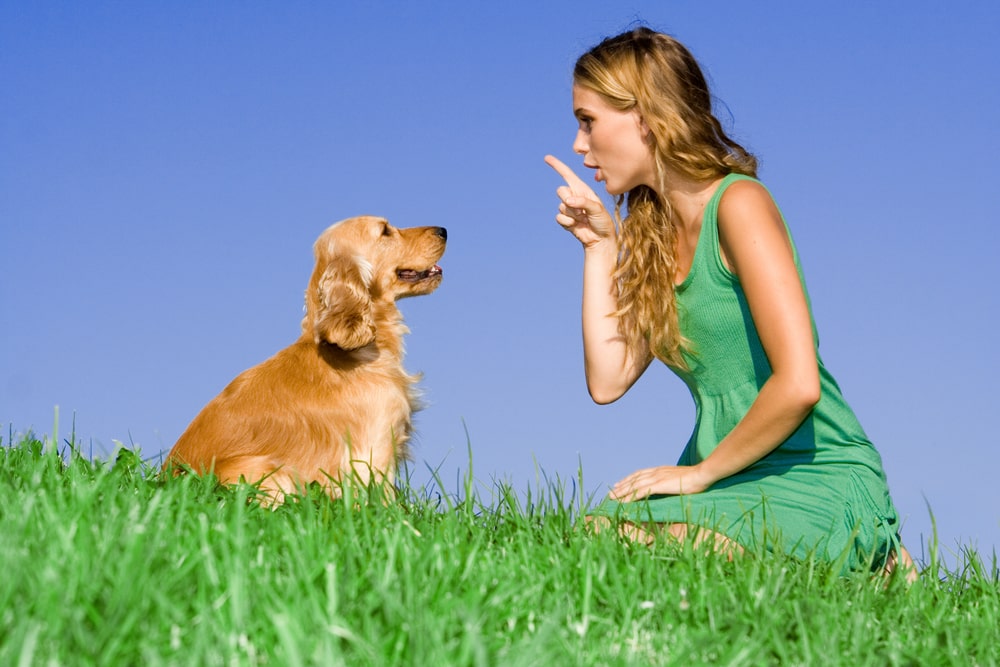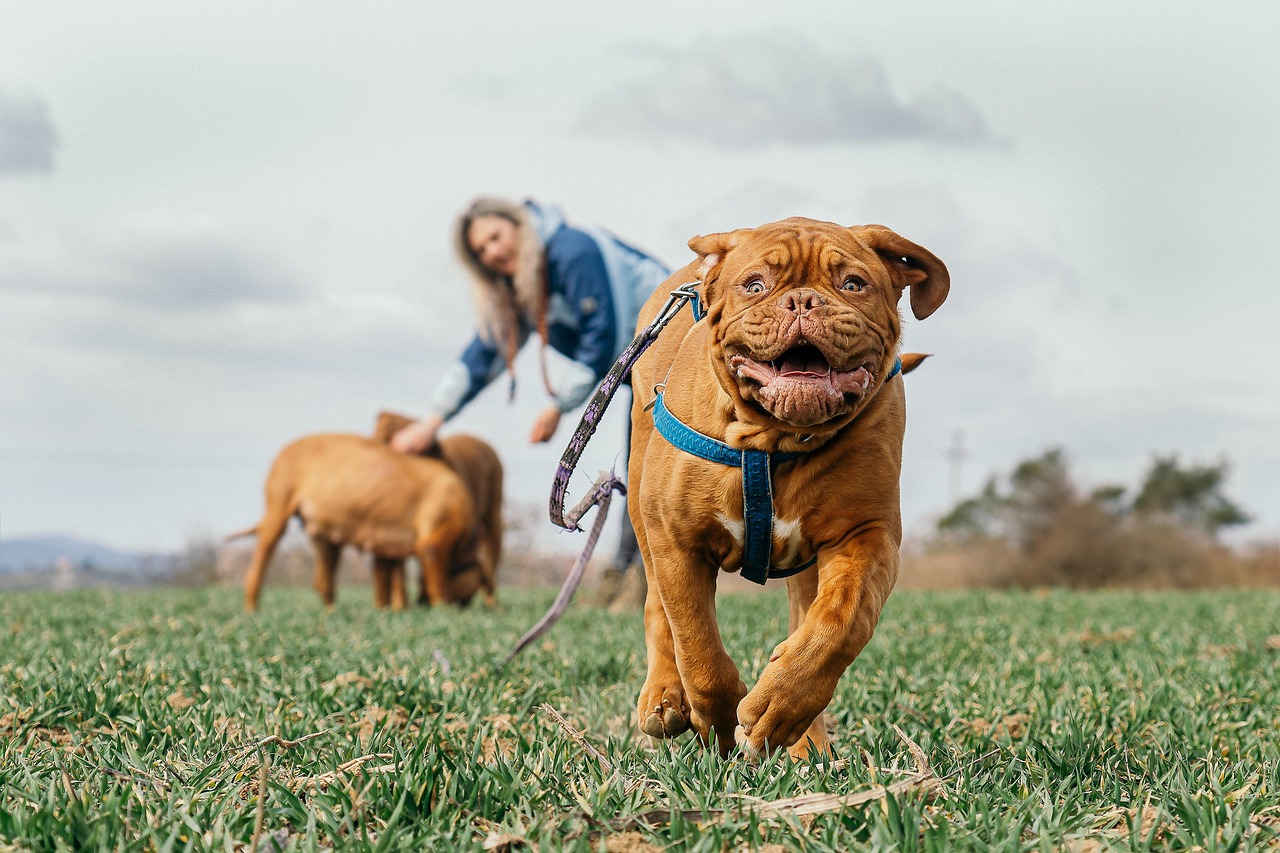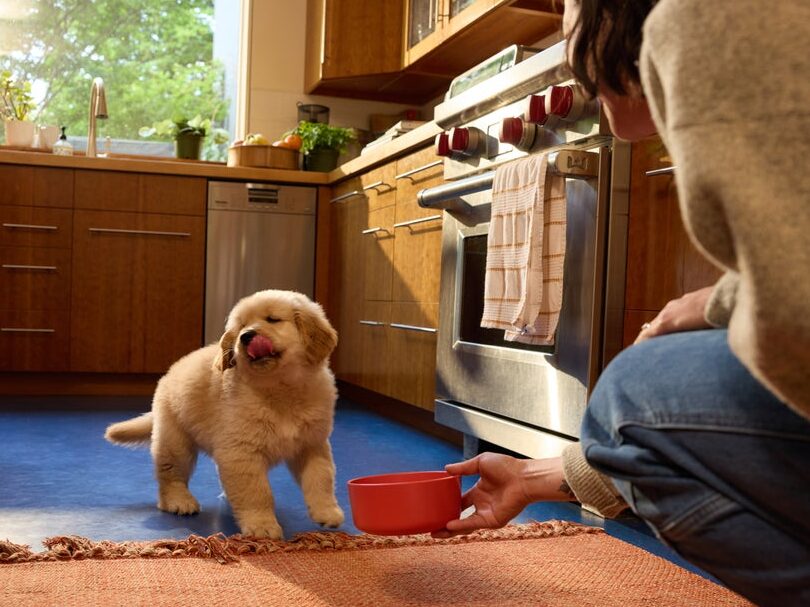Hey Ollie blog readers! We’re offering you an exclusive 60% OFF your starter box! Try now!
One of the ways your dog communicates with you is through barking. You might find excessive barking annoying or it may cause problems if your pet is barking excessively when you aren’t home. While it is important that you’re able to communicate with your dog, you might need them to stop barking. The key to stopping your pet from barking when they shouldn’t is to start by understanding why your dog is barking in the first place.
Why do dogs bark?
Most of the reasons why pups bark can be summed up into nine main reasons. They are:
- Excitement – if your dog is excited he may bark to let you know. Look for a wagging tail and a wiggly body. Your dog also might be trying to tell you company has pulled into your driveway, someone they like is walking by the window, or its time to eat.
- Playing – When your dog is playing he might bow with his rear end in the air and wag his tail as he barks, encouraging you (or another dog) to play with them. This might only be a few barks and is not something you want to discourage if you can help it.
- Protecting territory – If your pet barks every time the mailman comes within 3 feet of your home this may be because he is protecting his territory. Same goes for any strangers (people or animal) that venture on to your property.
- Danger – If there is a physical hazard like a fire or car accident your pet may be barking to alert you.
- Anxiety – If your dog is anxious or scared it might manifest as barking.
- Boredom – Sometimes dogs bark just because they are bored.
- Attention seeking – This goes along with boredom if your pet wants attention they may bark to let you know about it!
- Demand barking – Does your dog bark when he wants a cookie or toy? This is called demand barking.
- Bug bites, bee stings or pain – Just like you might yelp in pain if you’re bitten or stung, your pet may bark. If your dog starts barking out of nowhere check for bug bites, stings or other acute injuries.

If your dog barks excessively, DON’T:
- Yell: If you raise your voice your dog may think you’re joining in or encouraging the behavior.
- Give them attention or give in to demands: If your pet is demand barking or attention seeking – you don’t want to give them a treat or attention to quiet them. This can reinforce the behavior. They may start to think that if they bark they get what they want. If your pet is barking for attention, try to turn your back or ignore them until they are quiet. Once they are quiet, you can give them all the praise, treats and attention they desire.
- Allow the problem to persist:the longer your pet barks the harder it will be to change the behavior. If you are having an issue with barking try to get to the root cause and address it before it becomes a larger behavioral problem. Eventaully the barking might just become a habbit for your dog and that’s going to be harder to break.
- Use shock collars or punishment to make your pet stop barking: These methods may work in the short term but can do long term damage to your relationship with your pet as well as his mental and physical wellbeing.
To stop your dog from barking, try these six tips instead:
- If your pet is barking playfully or due to excitement and it is not excessive, you may just let them bark on occasion. Don’t do anything to reinforce this behavior either negatively or positively. Your pup will get their barks out and you can move on!
Should the barking be too much and you want them to stop, teach the command quiet or redirect them to another activity. Some exercise may help as a tired dog won’t want to bark as much.
To teach your pet to be quiet, start by making sure you have a high-value treat. When your dog gets excited and barks, wait for him to stop. Once your pet is quiet offer praise and treats. You’ll probably need to do this a few times until your pet associates stopping barking with getting treats. Once this happens, start using the word. When your dog stops barking say quiet, then offer them praise and treat as before. Repeat this process a few times until your dog associates not barking with the quiet command. Then, when your dog is barking, tell him quiet. Wait till he stops (it might take a few seconds) and then offer lots of praise and treats. Eventually, you should be able to fade out the treats every time you ask your dog to be quiet. Make sure to continue to provide the positive reinforcement (praise) even if you do not offer the treat.
- If your dog is barking because he is territorial, the quiet cue may work for him as well. Alternatively, you may want to ask him to sit as people come to the door. If you know when the mailman or a visitor will be arriving be proactive and put your pet on his leash. Ask your pet to sit as your guest enters your home or makes a delivery. You can reward good behavior or ask your guest to give your pet the treats. This may help your dog associate visitors with treats. Once your pet is comfortable with your guest you can also allow them to greet your dog with pets or toys too.
- If your dog is barking to alert you to danger you will want to figure out what the danger is and move away from it. Should the danger just be perceived danger, a plastic bag or a person in a hat, you may need to work with your pet to desensitize him to the dangers. This may be especially important if you have a rescue dog and the dog has triggers from its past.
- For dogs that bark due to anxiety or boredom, you may be able to break the barking by providing something else to do. A companion like a dog walker or another pet might help. For boredom, you can use puzzle toys or other enrichment activities to keep them mentally and physically stimulated. Your pet may bark if they’re left alone while you’re at work all day. This will annoy your neighbors and potentially cause problems if you live in an apartment. You want to help your dog feel safe and comfortable when you aren’t there.
- Attention seeking and demand barking may require some discipline on your part to overcome. You do not ever want to give in to your pet’s demands. Whether they are barking for food or attention it is important you stay consistent and ignore this barking. Feel free to reward generously when your dog has quieted down. The reward can be a toy, treat or simply your attention.
- For acute medical issues like a bug bite, bee sting or if you suspect your pet is barking because he is in pain you’ll want to be sure to treat the source of the discomfort. If the situation is acute, like a bee sting the barking should resolve itself once your pet has been treated. For a chronic pain issue or disorder that causes pain (like arthritis), you will want to work with your vet on a plan to manage your dog’s pain and keep him comfortable. That should help resolve the barking. If not, you may want to consult the vet or a trainer to help you manage the barking.
The Ollie blog is devoted to helping pet parents lead healthier lives with their pups. If you want to learn more about our fresh, human-grade food, check out MyOllie.com.
Tagged As:

The nutrition your dog needs,
the food they want.

Enjoying our articles? Subscribe our Newsletters and get new articles directly to your inbox
You might also like
23 September 2025
6 MINS READ
Back to School: Training Your Dog at Any Age
As we hit back-to-school season rolls around, it’s not just kids who benefit from sharpening their skills and learning something new—our dogs can, too! Training isn’t limited to puppies or p…
by Ollie Pets
23 September 2025
7 MINS READ
Lace Up and Leash Up: A Beginner’s Guide to Running with Your Dog
Running is one of the simplest ways to stay active, and it’s even better with a canine companion. Not only does running with your dog keep you both in great shape, it also strengthens your bond …
by Ollie Pets
13 May 2025
8 MINS READ
Puppy Training Guide & Behavior Timeline
Bringing home a puppy is pure magic. It’s also pure chaos—tiny teeth, zoomies, accidents in the house, and moments that make you wonder if you’re raising a future genius or a tiny tornado. …
by Ollie Pets







